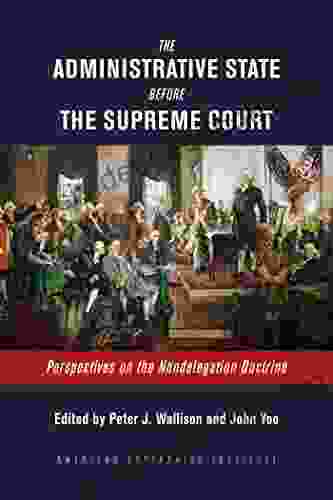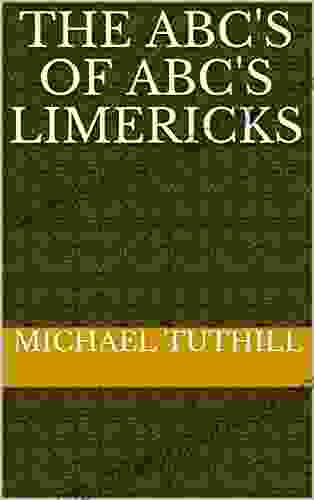Perspectives On The Nondelegation Doctrine

5 out of 5
| Language | : | English |
| File size | : | 963 KB |
| Text-to-Speech | : | Enabled |
| Screen Reader | : | Supported |
| Enhanced typesetting | : | Enabled |
| Word Wise | : | Enabled |
| Print length | : | 397 pages |
| X-Ray for textbooks | : | Enabled |
The Nondelegation Doctrine is a fundamental principle in constitutional law that prohibits the federal government from delegating its legislative authority to other entities or individuals. It is based on the principle of separation of powers, which divides the government into three branches: legislative, executive, and judicial. The legislative branch is responsible for making laws, while the executive branch is responsible for enforcing them, and the judicial branch is responsible for interpreting them. The Nondelegation Doctrine ensures that the legislative branch retains its primary lawmaking authority and does not delegate it to other branches or entities.
Historical Roots of the Nondelegation Doctrine
The Nondelegation Doctrine has its roots in the early days of the American republic. The Founding Fathers were concerned about the potential for tyranny if the government were to be concentrated in the hands of a single branch. They therefore divided the government into three branches and gave each branch specific powers. The legislative branch was given the power to make laws, while the executive branch was given the power to enforce them, and the judicial branch was given the power to interpret them. The Nondelegation Doctrine was intended to prevent the legislative branch from delegating its lawmaking authority to the other branches or to private entities.
Constitutional Basis of the Nondelegation Doctrine
The Nondelegation Doctrine is based on the principle of separation of powers, which is enshrined in the Constitution. Article I, Section 1 of the Constitution states that "All legislative Powers herein granted shall be vested in a Congress of the United States, which shall consist of a Senate and House of Representatives." This clause has been interpreted by the Supreme Court to mean that the legislative branch has the exclusive power to make laws. The Nondelegation Doctrine prohibits the legislative branch from delegating this power to other entities or individuals.
Perspectives on the Nondelegation Doctrine
There are a variety of perspectives on the Nondelegation Doctrine. Some scholars argue that the doctrine is essential to the maintenance of separation of powers. They argue that if the legislative branch were allowed to delegate its lawmaking authority to other branches or entities, it would undermine the system of checks and balances that is essential to a free and democratic society. Others argue that the doctrine is too restrictive and that it prevents the government from responding effectively to the complex challenges of modern society. They argue that the legislative branch should be allowed to delegate its authority to other entities or individuals in order to ensure that laws are effectively implemented and enforced.
Controversies Surrounding the Nondelegation Doctrine
The Nondelegation Doctrine has been the subject of numerous controversies. One of the most significant controversies is the extent to which the doctrine applies to independent agencies. Independent agencies are government agencies that are not subject to the direct control of the president or any other government official. They are typically created by Congress to perform specific functions, such as regulating a particular industry or enforcing a particular law. Some scholars argue that the Nondelegation Doctrine does not apply to independent agencies because they are not part of the executive branch. Others argue that the doctrine does apply to independent agencies because they exercise governmental authority and are therefore subject to the same constitutional limitations as other government entities.
The Nondelegation Doctrine is a complex and controversial issue. There are a variety of perspectives on the doctrine, and it has been the subject of numerous controversies. The debate over the doctrine is likely to continue for many years to come.
5 out of 5
| Language | : | English |
| File size | : | 963 KB |
| Text-to-Speech | : | Enabled |
| Screen Reader | : | Supported |
| Enhanced typesetting | : | Enabled |
| Word Wise | : | Enabled |
| Print length | : | 397 pages |
| X-Ray for textbooks | : | Enabled |
Do you want to contribute by writing guest posts on this blog?
Please contact us and send us a resume of previous articles that you have written.
 Novel
Novel Chapter
Chapter Library
Library Paperback
Paperback Magazine
Magazine Paragraph
Paragraph Sentence
Sentence Glossary
Glossary Preface
Preface Synopsis
Synopsis Annotation
Annotation Manuscript
Manuscript Scroll
Scroll Codex
Codex Classics
Classics Narrative
Narrative Biography
Biography Autobiography
Autobiography Memoir
Memoir Reference
Reference Encyclopedia
Encyclopedia Dictionary
Dictionary Narrator
Narrator Character
Character Librarian
Librarian Borrowing
Borrowing Stacks
Stacks Periodicals
Periodicals Academic
Academic Journals
Journals Reading Room
Reading Room Rare Books
Rare Books Interlibrary
Interlibrary Literacy
Literacy Thesis
Thesis Dissertation
Dissertation Storytelling
Storytelling Awards
Awards Book Club
Book Club Theory
Theory A C Davison
A C Davison Michael Harper
Michael Harper Jason H Rogers
Jason H Rogers Julia Crouch
Julia Crouch Margot C J Mabie
Margot C J Mabie Emma Lynden
Emma Lynden Gary Blackwood
Gary Blackwood Campbell F Scribner
Campbell F Scribner Charlie Elder
Charlie Elder Latisha Hayes
Latisha Hayes Joseph Di Prisco
Joseph Di Prisco Lenora Inez Brown
Lenora Inez Brown Owen Bennett
Owen Bennett Mary Waldorf
Mary Waldorf 50minutes Com
50minutes Com Thomas Barnes Md
Thomas Barnes Md Claire Fox
Claire Fox Ali Benyon
Ali Benyon Gage Averill
Gage Averill 4th Edition Kindle Edition
4th Edition Kindle Edition
Light bulbAdvertise smarter! Our strategic ad space ensures maximum exposure. Reserve your spot today!

 Aldous HuxleyThe Blue Lady New Look And Other Curiosities: A Journey into the World of...
Aldous HuxleyThe Blue Lady New Look And Other Curiosities: A Journey into the World of...
 Jerome PowellDiamonds and Triangles Pen Wrap, Lip Balm Cover, and Lighter Cover: Beaded...
Jerome PowellDiamonds and Triangles Pen Wrap, Lip Balm Cover, and Lighter Cover: Beaded... Stuart BlairFollow ·3.4k
Stuart BlairFollow ·3.4k Grayson BellFollow ·13.7k
Grayson BellFollow ·13.7k Owen SimmonsFollow ·8.5k
Owen SimmonsFollow ·8.5k Timothy WardFollow ·4.8k
Timothy WardFollow ·4.8k Vic ParkerFollow ·6.3k
Vic ParkerFollow ·6.3k Haruki MurakamiFollow ·6k
Haruki MurakamiFollow ·6k Joshua ReedFollow ·12.5k
Joshua ReedFollow ·12.5k Devon MitchellFollow ·6.7k
Devon MitchellFollow ·6.7k

 Russell Mitchell
Russell MitchellGCSE Set Text Student Edition: Collins Classroom Classics...
The GCSE Set Text Student Edition: Collins...

 Ralph Turner
Ralph TurnerSix Sigma Lean Green Belt Training for Beginners with...
What is Six...

 Travis Foster
Travis Foster10 Life-Changing Lessons I Learned When I Was Single
Being single can...

 Jermaine Powell
Jermaine PowellOne Great Insight Is Worth a Thousand Good Ideas
In the competitive and...
5 out of 5
| Language | : | English |
| File size | : | 963 KB |
| Text-to-Speech | : | Enabled |
| Screen Reader | : | Supported |
| Enhanced typesetting | : | Enabled |
| Word Wise | : | Enabled |
| Print length | : | 397 pages |
| X-Ray for textbooks | : | Enabled |












